
In many industrial sectors, customers are requesting increasingly connected products. They also have rising expectations concerning safety, sustainability, and cost-effectiveness. Meeting these demands necessitates an exceptionally modular and multidisciplinary approach, resulting in high complexity.
For many years, model-based engineering, which leverages abstraction, computation and visualization, has demonstrated its ability to address this complexity. While many major companies in sectors like aerospace, defense, transportation, and finance have embraced this approach, obstacles still hinder its adoption in other domains, especially among smaller organizations.
In this context, CEA-List and Obeo have joined forces to collaborate on overcoming scientific and technological challenges of holistic engineering.
Specifically, CEA-List and Obeo advocate for a low-code approach that dramatically reduces the complexity of developing software modeling tools. Based on a generic technology that separates the technical and functional aspects, it allows the creators of such tools to significantly reduce the amount of code they need to write: instead of coding the whole tool, they describe the behavior and the look and feel, and delegate technical complexity to a low-code engine. This fosters innovation, enhances technical stability, and streamlines the maintenance and evolution of software modeling tools.
Utilizing this approach (with Eclipse Sirius Desktop and Eclipse Papyrus Relatives), both CEA-List and Obeo have extensive experience in developing engineering modeling tools, including Eclipse Capella, Obeo SmartEA, Nablab, IS Designer, PooSL, Papyrus for Robotics, Papyrus for Manufacturing, and more.
In the short term, the collaboration is going to deliver a modernized version of the globally adopted UML product Papyrus, through a migration to Sirius Desktop. This transformation will dramatically reduce the number of Papyrus’ specific lines of code, thus improving its maintenance and scalability.
In the medium term, CEA-List and Obeo aim to provide a new generation of open-source model-based solutions based on web technologies, including the development of web editors for Papyrus, as well as new generic and reusable services in Sirius Web to meet the needs of Papyrus.
In the long run, CEA-List and Obeo plan to implement a web-based version of the forthcoming systems engineering standard SysML v2. The outcome will be available in the open-source project SysON hosted by the Eclipse Foundation, and progressively integrated in Papyrus.
In parallel with these efforts, Obeo will develop a commercial offering to support professional adoption and large-scale collaborative usage of these new products and technologies, such as teams management, or role-based access control. Meanwhile CEA-List will drive research and development initiatives to generate collaborative innovation from international industrial and academic partners on topics such as AI for engineering, simulation, digital twins, multidisciplinary design, and graphical user interfaces.
Through this collaboration, CEA-List and Obeo pledge to establish open-source foundations for future engineering modeling platforms, incorporating UML, SysML, the upcoming SysML v2, and domain-specific languages (DSL).